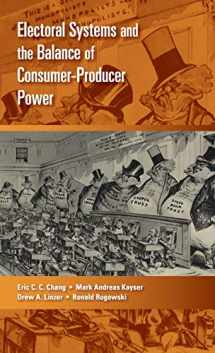
Electoral Systems and the Balance of Consumer-Producer Power (Cambridge Studies in Comparative Politics)
ISBN-13:
9780521192651
ISBN-10:
052119265X
Author:
Ronald Rogowski, Eric C. C. Chang, Mark Andreas Kayser, Drew A. Linzer
Publication date:
2010
Publisher:
Cambridge University Press
Format:
Hardcover
280 pages
FREE US shipping
Book details
ISBN-13:
9780521192651
ISBN-10:
052119265X
Author:
Ronald Rogowski, Eric C. C. Chang, Mark Andreas Kayser, Drew A. Linzer
Publication date:
2010
Publisher:
Cambridge University Press
Format:
Hardcover
280 pages
Summary
Electoral Systems and the Balance of Consumer-Producer Power (Cambridge Studies in Comparative Politics) (ISBN-13: 9780521192651 and ISBN-10: 052119265X), written by authors
Ronald Rogowski, Eric C. C. Chang, Mark Andreas Kayser, Drew A. Linzer, was published by Cambridge University Press in 2010.
With an overall rating of 3.7 stars, it's a notable title among other
books. You can easily purchase or rent Electoral Systems and the Balance of Consumer-Producer Power (Cambridge Studies in Comparative Politics) (Hardcover) from BooksRun,
along with many other new and used
books
and textbooks.
And, if you're looking to sell your copy, our current buyback offer is $0.3.
Description
This book investigates the effects of electoral systems on the relative legislative and, hence, regulatory influence of competing interests in society. Building on Ronald Rogowski and Mark Andreas Kayser's extension of the classic Stigler-Peltzman model of regulation, the authors demonstrate that majoritarian electoral arrangements should empower consumers relative to producers. Employing real price levels as a proxy for consumer power, the book rigorously establishes this proposition over time, within the OECD, and across a large sample of developing countries. Majoritarian electoral arrangements depress real prices by approximately ten percent, all else equal. The authors carefully construct and test their argument and broaden it to consider the overall welfare effects of electoral system design and the incentives of actors in the choice of electoral institutions.


We would LOVE it if you could help us and other readers by reviewing the book
Book review

Congratulations! We have received your book review.
{user}
{createdAt}
by {truncated_author}


